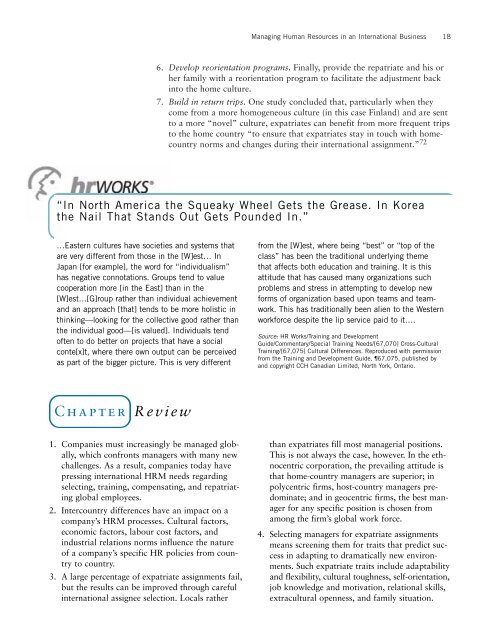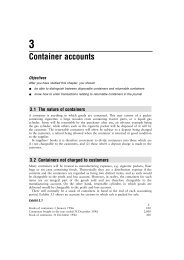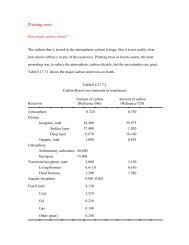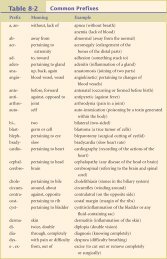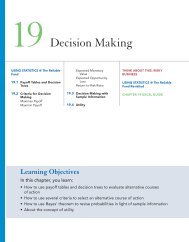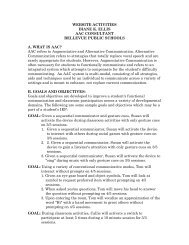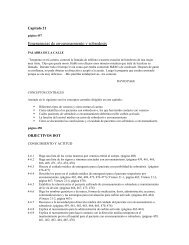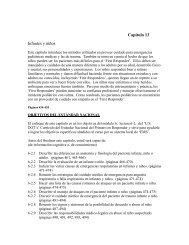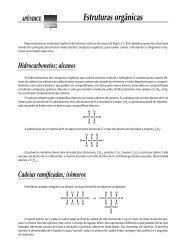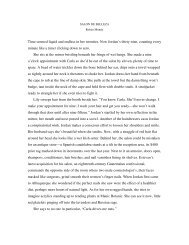Managing Human Resources in an International Business
Managing Human Resources in an International Business
Managing Human Resources in an International Business
You also want an ePaper? Increase the reach of your titles
YUMPU automatically turns print PDFs into web optimized ePapers that Google loves.
Chapter Review<br />
1. Comp<strong>an</strong>ies must <strong>in</strong>creas<strong>in</strong>gly be m<strong>an</strong>aged globally,<br />
which confronts m<strong>an</strong>agers with m<strong>an</strong>y new<br />
challenges. As a result, comp<strong>an</strong>ies today have<br />
press<strong>in</strong>g <strong>in</strong>ternational HRM needs regard<strong>in</strong>g<br />
select<strong>in</strong>g, tra<strong>in</strong><strong>in</strong>g, compensat<strong>in</strong>g, <strong>an</strong>d repatriat<strong>in</strong>g<br />
global employees.<br />
2. Intercountry differences have <strong>an</strong> impact on a<br />
comp<strong>an</strong>y’s HRM processes. Cultural factors,<br />
economic factors, labour cost factors, <strong>an</strong>d<br />
<strong>in</strong>dustrial relations norms <strong>in</strong>fluence the nature<br />
of a comp<strong>an</strong>y’s specific HR policies from country<br />
to country.<br />
3. A large percentage of expatriate assignments fail,<br />
but the results c<strong>an</strong> be improved through careful<br />
<strong>in</strong>ternational assignee selection. Locals rather<br />
<strong>M<strong>an</strong>ag<strong>in</strong>g</strong> <strong>Hum<strong>an</strong></strong> <strong>Resources</strong> <strong>in</strong> <strong>an</strong> <strong>International</strong> Bus<strong>in</strong>ess 18<br />
6. Develop reorientation programs. F<strong>in</strong>ally, provide the repatriate <strong>an</strong>d his or<br />
her family with a reorientation program to facilitate the adjustment back<br />
<strong>in</strong>to the home culture.<br />
7. Build <strong>in</strong> return trips. One study concluded that, particularly when they<br />
come from a more homogeneous culture (<strong>in</strong> this case F<strong>in</strong>l<strong>an</strong>d) <strong>an</strong>d are sent<br />
to a more “novel” culture, expatriates c<strong>an</strong> benefit from more frequent trips<br />
to the home country “to ensure that expatriates stay <strong>in</strong> touch with homecountry<br />
norms <strong>an</strong>d ch<strong>an</strong>ges dur<strong>in</strong>g their <strong>in</strong>ternational assignment.” 72<br />
“In North America the Squeaky Wheel Gets the Grease. In Korea<br />
the Nail That St<strong>an</strong>ds Out Gets Pounded In.”<br />
…Eastern cultures have societies <strong>an</strong>d systems that<br />
are very different from those <strong>in</strong> the [W]est… In<br />
Jap<strong>an</strong> [for example], the word for “<strong>in</strong>dividualism”<br />
has negative connotations. Groups tend to value<br />
cooperation more [<strong>in</strong> the East] th<strong>an</strong> <strong>in</strong> the<br />
[W]est…[G]roup rather th<strong>an</strong> <strong>in</strong>dividual achievement<br />
<strong>an</strong>d <strong>an</strong> approach [that] tends to be more holistic <strong>in</strong><br />
th<strong>in</strong>k<strong>in</strong>g—look<strong>in</strong>g for the collective good rather th<strong>an</strong><br />
the <strong>in</strong>dividual good—[is valued]. Individuals tend<br />
often to do better on projects that have a social<br />
conte[x]t, where there own output c<strong>an</strong> be perceived<br />
as part of the bigger picture. This is very different<br />
from the [W]est, where be<strong>in</strong>g “best” or “top of the<br />
class” has been the traditional underly<strong>in</strong>g theme<br />
that affects both education <strong>an</strong>d tra<strong>in</strong><strong>in</strong>g. It is this<br />
attitude that has caused m<strong>an</strong>y org<strong>an</strong>izations such<br />
problems <strong>an</strong>d stress <strong>in</strong> attempt<strong>in</strong>g to develop new<br />
forms of org<strong>an</strong>ization based upon teams <strong>an</strong>d teamwork.<br />
This has traditionally been alien to the Western<br />
workforce despite the lip service paid to it….<br />
Source: HR Works/Tra<strong>in</strong><strong>in</strong>g <strong>an</strong>d Development<br />
Guide/Commentary/Special Tra<strong>in</strong><strong>in</strong>g Needs/[67,070] Cross-Cultural<br />
Tra<strong>in</strong><strong>in</strong>g/[67,075] Cultural Differences. Reproduced with permission<br />
from the Tra<strong>in</strong><strong>in</strong>g <strong>an</strong>d Development Guide, 67,075, published by<br />
<strong>an</strong>d copyright CCH C<strong>an</strong>adi<strong>an</strong> Limited, North York, Ontario.<br />
th<strong>an</strong> expatriates fill most m<strong>an</strong>agerial positions.<br />
This is not always the case, however. In the ethnocentric<br />
corporation, the prevail<strong>in</strong>g attitude is<br />
that home-country m<strong>an</strong>agers are superior; <strong>in</strong><br />
polycentric firms, host-country m<strong>an</strong>agers predom<strong>in</strong>ate;<br />
<strong>an</strong>d <strong>in</strong> geocentric firms, the best m<strong>an</strong>ager<br />
for <strong>an</strong>y specific position is chosen from<br />
among the firm’s global work force.<br />
4. Select<strong>in</strong>g m<strong>an</strong>agers for expatriate assignments<br />
me<strong>an</strong>s screen<strong>in</strong>g them for traits that predict success<br />
<strong>in</strong> adapt<strong>in</strong>g to dramatically new environments.<br />
Such expatriate traits <strong>in</strong>clude adaptability<br />
<strong>an</strong>d flexibility, cultural toughness, self-orientation,<br />
job knowledge <strong>an</strong>d motivation, relational skills,<br />
extracultural openness, <strong>an</strong>d family situation.


